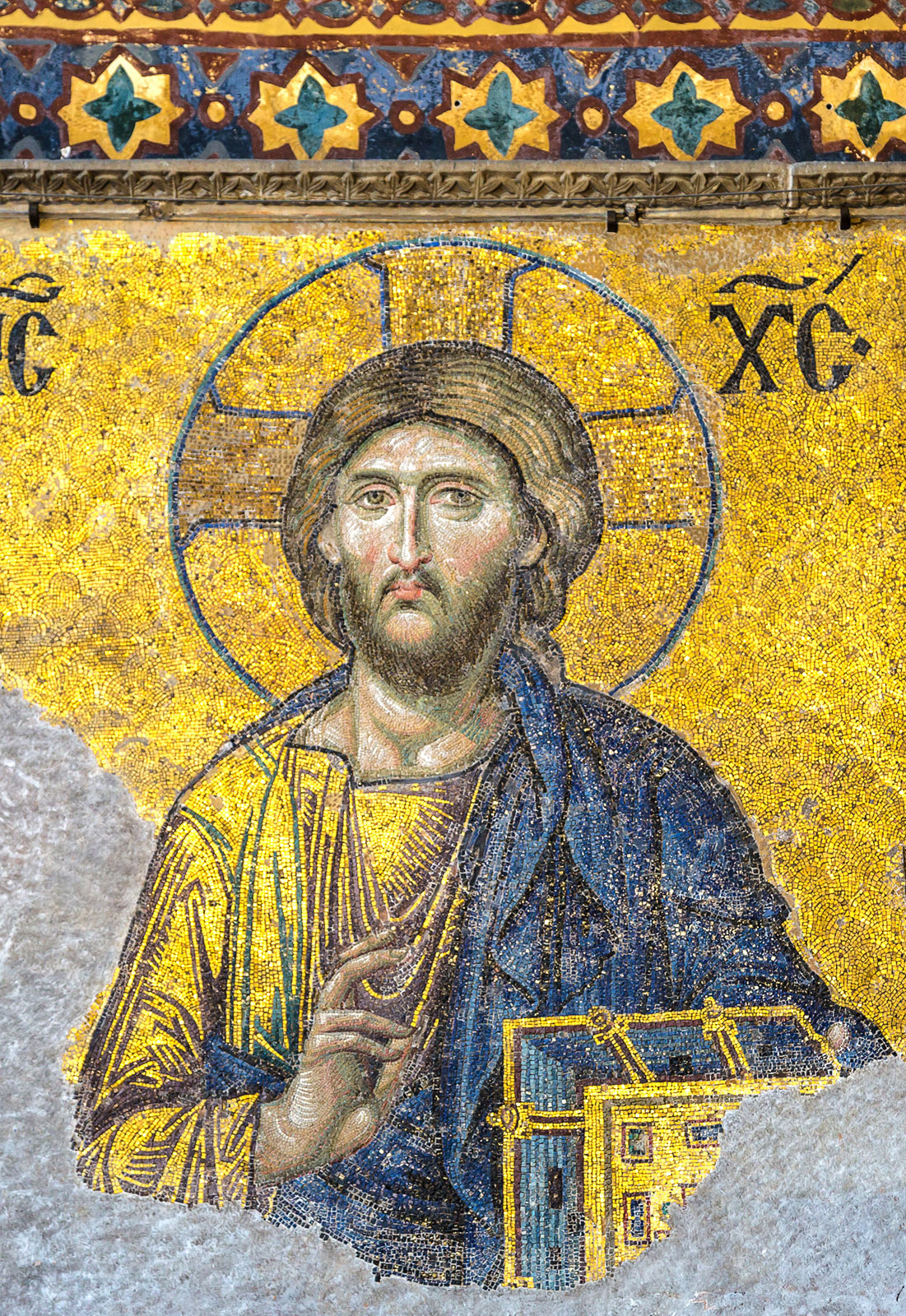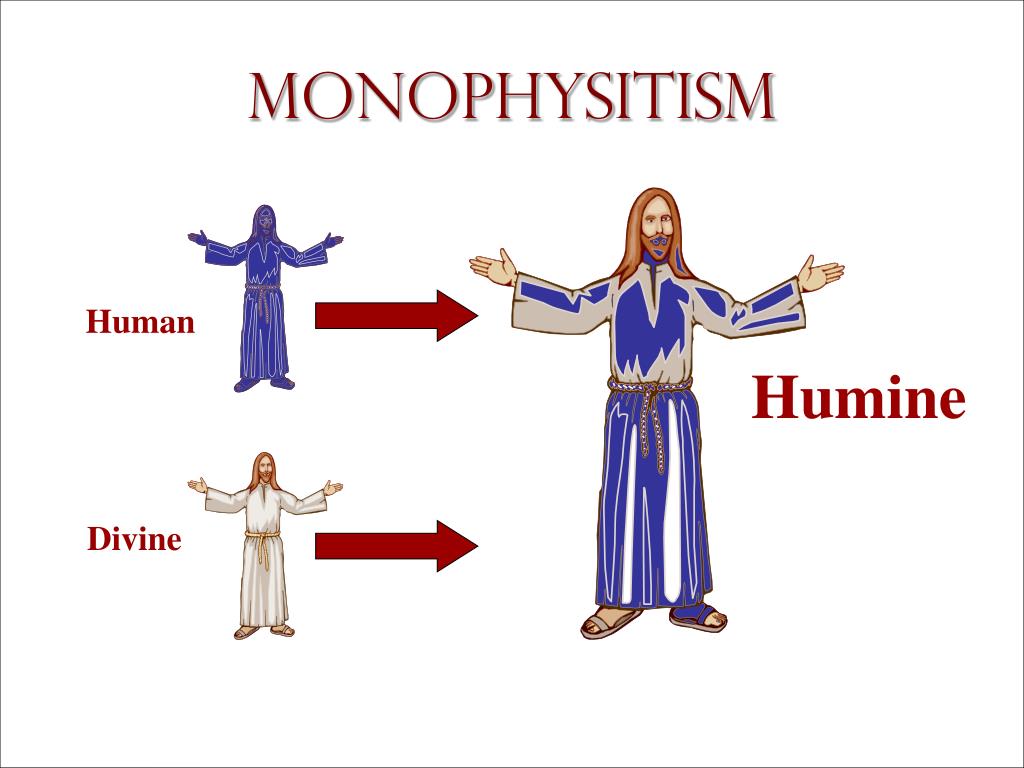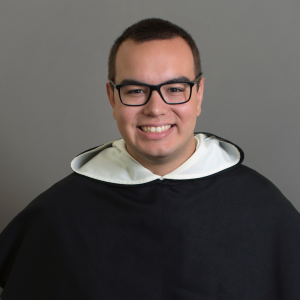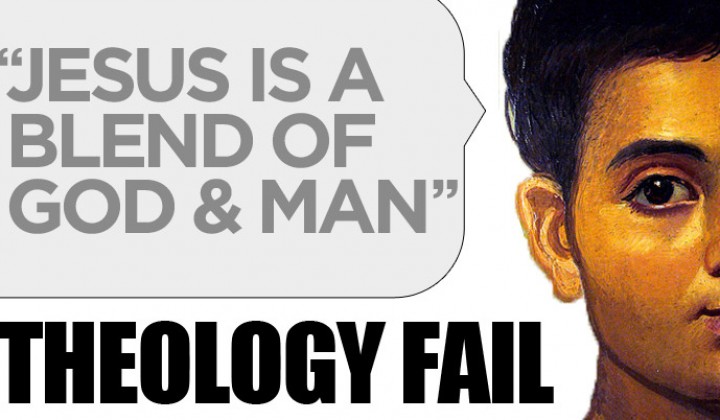
-Deesis mosaic Hagia Sophia, Constantinople.

– “humine” better shown as a uniform light blue/purple, an even mixture of white (divine) and dark blue/purple (human); both natures diluted/diminished. Catholic teaching: there is a fully human Jesus and a fully God Jesus, but one Jesus. Two natures in one (B)being. Neither is diminished/diluted.
Monophysitism originated as a reaction to Nestorianism. The Monophysites (led by a man named Eutyches) were horrified by Nestorius’s implication that Christ was two people with two different natures (human and divine). They went to the other extreme, claiming that Christ was one person with only one nature (a fusion of human and divine elements). They are thus known as Monophysites because of their claim that Christ had only one nature (Greek: mono = one; physis = nature).
Catholic theologians recognized that Monophysitism was as bad as Nestorianism because it denied Christ’s full humanity and full divinity. If Christ did not have a fully human nature, then he would not be fully human (and the Incarnation did not happen), and if he did not have a fully divine nature then he was not fully divine (and we are not saved by God, Himself).

-by Br Nicodemus Thomas, OP
“Today’s patron, Saint Leo (the Great) is indeed great. The fifth-century bishop of Rome reigned as Pope during the last years of the Western Roman empire. His list of accomplishments is impressive. He heroically met with Attila the Hun to save the Italian peninsula from invasion, and he was a father to the Roman people whom the emperors abandoned. However, the Church does not call St. Leo “great” merely because of his patrician birth or his political savvy. After all, the empire was falling apart and would end officially a decade after his death. So it might seem, if we only examine his secular accomplishments, that St. Leo is called “great” for reasons that do not merit the title.
During the fifth century, St. Leo preached against a group called the Monophysites who argued that there is a single nature in Christ. In other words, they claimed that Jesus Christ is not both really God and really man. Saint Leo, both in his famous Letter to Flavian and in his preaching, refuted their heresy and elucidated the mystery of the Incarnation for his brother bishops. Leo’s theology is not written in inaccessible language or specialized jargon. Rather, this Doctor of the Church explains to his universal flock the beauty and fittingness of the Incarnation. In Leo’s Christmas homily, he explains: “[Jesus] came to overthrow the devil, the origin of death, in that very nature by which he [the devil] had overthrown mankind.”
The profundity of Leo’s reflection shines forth in the closing lines of his homily when he exhorts Christians to recall their dignity because they become “partners in the Divine nature.” The Pope is not claiming that Christians are now the divine essence; we have not become part of God, in a pantheistic sense. Rather, since God assumed our nature in the person of Jesus, Leo is arguing that we should “throw off our old nature and all its ways and as we have come to birth in Christ, let us renounce the works of the flesh.” In other words, we are able to be radically changed because “through the sacrament of baptism you have become a temple of the Holy Spirit.”
How are we changed into temples of the Holy Spirit? Leo reminds us in a homily from today’s Office of Readings, “[Jesus] overflowed with abundant riches from the very source of all grace, yet though he alone received much, nothing was given over to him without his sharing it.” This means that we are capable of receiving grace in Christ because he assumed our nature, a grace with transformative power. Through grace we are able to receive the theological virtues, the gifts of the Holy Spirit, and ultimately eternal life itself.
So why is Leo Great? Leo is not only great because he was a follower and imitator of Christ like all of the saints, but also because he preached Who Jesus is to all people. Therefore, the Church calls Leo “Saint” on account of his holiness and she has called him “great” on account of his teachings which not only make us wiser but also help us to know Jesus Christ. So let us celebrate St Leo, because as he reminds us Who Christ is, he also reminds us who we are. Although we are not all called to be great theologians and teachers like St Leo, through Christ we are called to be saints.”
Love & truth,
Matthew

-by Justin Holcomb
“Eutyches (378-454 AD) was in charge of the monastery at Constantinople and was second in command, only lower than the Bishop, in terms of authority there.
Is Jesus a Blend of God & Man?
The early church taught that Jesus Christ was one person with two natures—a divine nature and a human nature.
Eutyches was guilty of over-emphasizing the fact that Jesus Christ was one person and blurred the distinction between his divine and human natures. This was opposite of Nestorius’ heresy.
About Eutyches, church historian Stephen Nichols writes: “To him Christ was a third thing (the Latin expression is tertium quid)….One new and different person fashioned out of two natures is how he liked to put it. That is a theological way of saying yellow and blue makes green.”
When asked by Florentius if he believed there were two natures in Christ, Eutyches argued that there was only one nature in Christ after the incarnation:
Florentius
: “Do you or do you not admit that our Lord who is of the Virgin is consubstantial [with us] and of two natures after the incarnation?”
Eutyches
: “I admit that our Lord was of two natures before the union, but after the union one nature.”
Orthodox Response: Jesus Is Fully God & Fully Man
In his Tome, Leo the Great offers a beautiful response to the thought of Eutyches: “For just as the God [deity] is not changed by his compassion, so the man [manhood] is not swallowed up by the dignity [of the Godhead].” The human nature and the divine nature in Christ remain distinct and unmixed in the incarnation so that Jesus is truly God and truly man.
Flavian, who was the Bishop of Constantinople, called a synod that met at Constantinople in 448 at which the teachings of Eutyches were deemed heretical. In the Chalcedonian Creed there are phrases directed toward Eutyches: Christ is “to be acknowledged in two natures, without confusion, without change, without division, without separation; the distinction of natures being by no means taken away by the union but rather the property of each nature being preserved, and concurring in one person and one subsistence, not parted or divided in two persons, but one and the same Son, and only begotten, God the Word, the Lord Jesus Christ.”
Jesus Is Our Representative
Stephen Nichols clearly describes the problem with Eutyches’ teachings: “The problem with stressing the unity without the counterbalance of the two intact natures, as Eutyches does, is that Christ loses his human and divine identity. As such, he is not truly our representative. The Christ of Eutyches falls short of Paul’s teaching of Christ as the last Adam (Rom. 5:12-21Open in Logos Bible Software (if available); 1 Cor. 15:42-49Open in Logos Bible Software (if available)).”
The orthodox theologians of the first several centuries saw an intimate connection between the incarnation and the atoning work of Christ.
This is why Leo the Great writes:
“Without detriment therefore to the properties of either substance which then came together in one person, majesty took on humility, strength weakness, eternity mortality; and for the paying off of the debt belonging to our condition, inviolable nature was united with passible nature, and true God and true man were combined to form one Lord, so that, as suits the needs of our case, one and the same Mediator between God and man, the man Christ Jesus, could both die with the one and rise again with the other.”
Love,
Matthew
Summa Catechetica, "Neque enim quaero intelligere ut credam, sed credo ut intelligam." – St Anselm, "“Si comprehendus, non est Deus.” -St Augustine, "Let your religion be less of a theory, and more of a love affair." -G.K. Chesterton, “When we pray we speak to God; but when we read, God speaks to us.” -St Jerome, "As the reading of bad books fills the mind with worldly and poisonous sentiments; so, on the other hand, the reading of pious works fills the soul with holy thoughts and good desires." -St. Alphonsus Liguori, "And above all, be on your guard not to want to get anything done by force, because God has given free will to everyone and wants to force no one, but only proposes, invites and counsels." –St. Angela Merici, “Yet such are the pity and compassion of this Lord of ours, so desirous is He that we should seek Him and enjoy His company, that in one way or another He never ceases calling us to Him . . . God here speaks to souls through words uttered by pious people, by sermons or good books, and in many other such ways.” —St. Teresa of Avila, "I want a laity, not arrogant, not rash in speech, not disputatious, but men and women who know their religion, who enter into it, who know just where they stand, who know what they hold and what they do not, and who know their creed so well that they can give an account of it, who know so much of history that they can defend it. I want an intelligent, well-instructed laity… I wish you to enlarge your knowledge, to cultivate your reason, to get an insight into the relation of truth to truth, to learn to view things as they are, to understand how faith and reason stand to each other, what are the bases and principles of Catholicism, and where lie the main inconsistencies and absurdities of the Protestant theory.” -St. John Henry Newman, “Duties of Catholics Towards the Protestant View,” Lectures on the Present Position of Catholics in England, "We cannot always have access to a spiritual Father for counsel in our actions and in our doubts, but reading will abundantly supply his place by giving us directions to escape the illusions of the devil and of our own self-love, and at the same time to submit to the divine will.” —St. Alphonsus Ligouri, "The harm that comes to souls from the lack of reading holy books makes me shudder . . . What power spiritual reading has to lead to a change of course, and to make even worldly people enter into the way of perfection." –St. Padre Pio, "Screens may grab our attention, but books change our lives!" – Word on Fire, "Don't neglect your spiritual reading. Reading has made many saints!" -St Josemaría Escrivá, "Do you pray? You speak to the Bridegroom. Do you read? He speaks to you." —St. Jerome, from his Letter 22 to Eustochium, "Encounter, not confrontation; attraction, not promotion; dialogue, not debate." -cf Pope Francis, "God here speaks to souls through…good books“ – St Teresa of Avila, Interior Castle, "You will not see anyone who is really striving after his advancement who is not given to spiritual reading. And as to him who neglects it, the fact will soon be observed by his progress.” -St Athanasius, "To convert someone, go and take them by the hand and guide them." -St Thomas Aquinas, OP. 1 saint ruins ALL the cynicism in Hell & on Earth. “When we pray we talk to God; when we read God talks to us…All spiritual growth comes from reading and reflection.” -St Isidore of Seville, “Also in some meditations today I earnestly asked our Lord to watch over my compositions that they might do me no harm through the enmity or imprudence of any man or my own; that He would have them as His own and employ or not employ them as He should see fit. And this I believe is heard.” -GM Hopkins, SJ, "Only God knows the good that can come about by reading one good Catholic book." — St. John Bosco, "Why don't you try explaining it to them?" – cf St Peter Canisius, SJ, Doctor of the Church, Doctor of the Catechism, "Already I was coming to appreciate that often apologetics consists of offering theological eye glasses of varying prescriptions to an inquirer. Only one prescription will give him clear sight; all the others will give him at best indistinct sight. What you want him to see—some particular truth of the Faith—will remain fuzzy to him until you come across theological eye glasses that precisely compensate for his particular defect of vision." -Karl Keating, "The more perfectly we know God, the more perfectly we love Him." -St Thomas Aquinas, OP, ST, I-II,67,6 ad 3, “But always when I was without a book, my soul would at once become disturbed, and my thoughts wandered." —St. Teresa of Avila, "Let those who think I have said too little and those who think I have said too much, forgive me; and let those who think I have said just enough thank God with me." –St. Augustine, "Without good books and spiritual reading, it will be morally impossible to save our souls." —St. Alphonsus Liguori "Never read books you aren't sure about. . . even supposing that these bad books are very well written from a literary point of view. Let me ask you this: Would you drink something you knew was poisoned just because it was offered to you in a golden cup?" -St. John Bosco " To teach in order to lead others to faith is the task of every preacher and of each believer." —St. Thomas Aquinas, OP. "Prayer purifies us, reading instructs us. Both are good when both are possible. Otherwise, prayer is better than reading." –St. Isidore of Seville “The aid of spiritual books is for you a necessity.… You, who are in the midst of battle, must protect yourself with the buckler of holy thoughts drawn from good books.” -St. John Chrysostom




